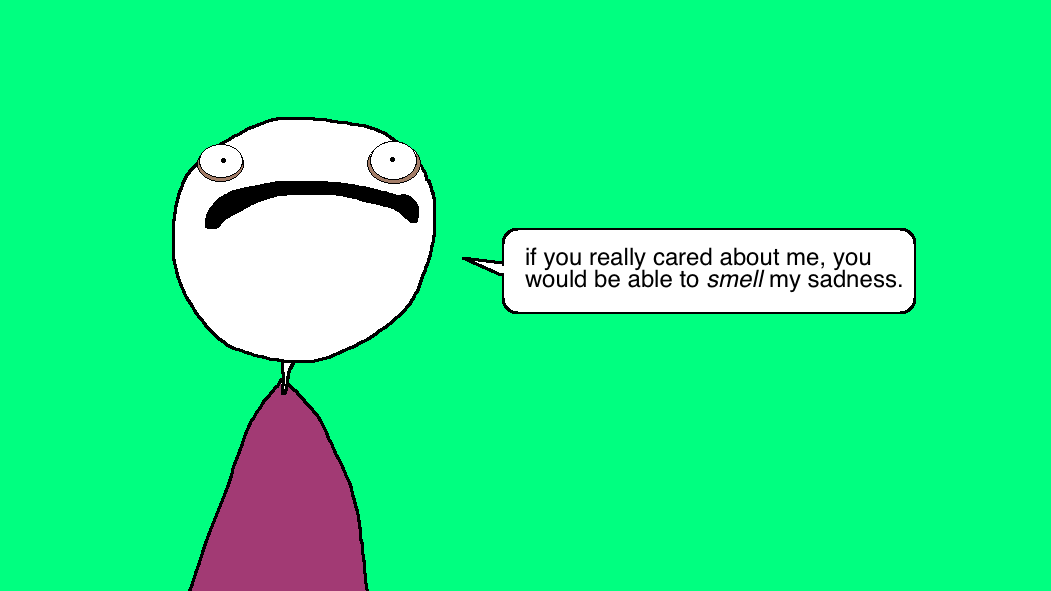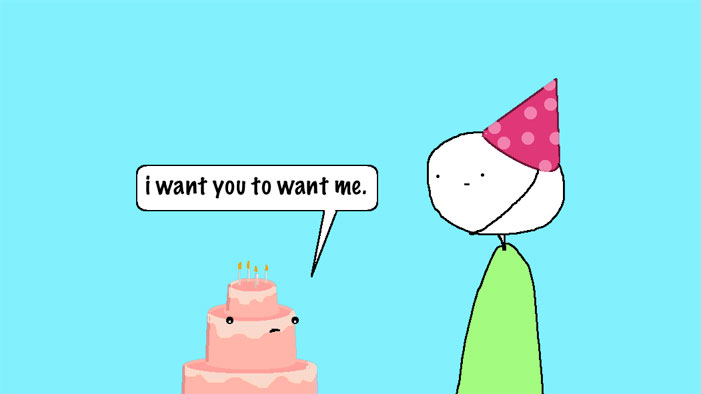Auntie SparkNotes: Why Don’t My Friends Realize I’m Depressed?!

Dear Auntie:
I am a great friend. I am the first person my friends come to for advice of any kind, I work hard to include everyone, and I put my friends before myself every time. My friends call me the welcoming committee because I’m the first to befriend the new kid. I can always tell when one of my friends is having a hard time, and I’m the shoulder to cry on. I always know what to say to make them feel better, I even once reduced a friend to happy tears when she had to move to Utah. I’m friends with everyone. What I’m trying to say is that I try to be the perfect friend, and according to my friends, I am.
You’d think a person like that would have a best friend, but no. Everyone is my best friend, but I’m no-one else’s. That is something that really hurts me, I am the kind of person who is completed by the people around her, so not having that one person I can go to is horrible. I just don’t understand why my friends take me for granted. I have been in a really dark place for the past year, and none of my friends have even noticed. It’s gotten to the point of self-harm, and I haven’t exactly been hiding my depression, but my friends are all completely oblivious. Only my cousin (who lives down the street) knows what I’ve been going through, but only because I told her. I was in Utah, and she was in Washington at the time, and we got into a really bad argument over it. She said some very hurtful things, and I ended up blocking her for a few days, even when she tried to talk to me (she still hasn’t apologized btw). I’ve stopped talking to her about this kind of thing after that, which is hard because I thought of her as my best friend at the time.
Some of these people I have known for years, but they can’t tell that anything is wrong! If one of them had been acting exactly like me I would have known right away. Spending time with my friends makes me feel even worse, because I always become background noise. This happens with my friends, with my family, with my siblings—everyone takes me for granted. It’s become a pattern. I meet someone, become really close, but then something happens and they leave me. It happened this year, last year, and the year before. I feel more comfortable with characters in stories that I read and my own. I’ve tried making new friends, but I feel so cut off from everyone. I feel so alone and unheard and used. If I feel alone with or without friends, why should I even try? Please give me some advice, Auntie!
We’ll get to that part, Sparkler. But before we get to the advice-giving portion of this response, we need to take a little spin back through your letter and tie a couple of loose ends together. And if you’re not sure what I mean, I’m talking about the part where you say this:
I just don’t understand why my friends take me for granted. I have been in a really dark place for the past year, and none of my friends have even noticed.
Followed by this, in practically the same breath:
Only my cousin (who lives down the street) knows what I’ve been going through, but only because I told her.
Gee, that’s weird, isn’t it? It’s almost like telling people what’s going on with you is the single determining factor in whether or not they’re aware of it.
In other words, darling, it’s not exactly surprising that you feel unheard — because in order to be heard, you have to actually speak. Your friends aren’t mind readers; unless you open your mouth and use your words to say “I’m going through a really hard time,” they are never, ever, ever going to guess as much just by looking at you.
Unfortunately, that means that getting what you want in this case also means giving something up. This scenario you’re in — where you’re everybody’s confidante and therapist, always putting yourself second, always providing for other people the understanding you never receive yourself — is not just something that happened by accident. You’ve defaulted to this role because it does something for you, and based on your letter, it’s a fair bet that one of those things is to give you a satisfying sense of martyrdom. It’s the dark side of all the pride you take in being everyone’s BFF; you also get to take umbrage at what a better friend you are than all the people around you who aren’t as good at or dedicated to the exquisite art of friendship, while never having to take the scary step of being open and vulnerable about your needs.
So if you really want things to be different, then you’ll have to sacrifice whatever satisfaction you get from feeling wronged when people fail to meet your unexpressed expectations. There is no outcome here in which you keep not asking for what you need and yet somehow, magically receive it; you have to be brave enough to speak up, and gracious enough not to go nuclear (i.e. the way you did with your cousin) if people don’t respond perfectly. (Not to mention that as long as you’re coming into your relationships with this giant chip on your shoulder — where you’re basically sitting back with your arms folded, just waiting to cold-shoulder your friends for disappointing you — then it’s no surprise that they aren’t lasting the way you’d like them to. That kind of unspoken resentment is incredibly poisonous to even the most promising friendship.)
And look: I know this may all seem really unfair to you, when you yourself are so extraordinarily gifted at interpreting people’s moods and anticipating their needs without them having to say anything. But most people aren’t that intuitive, and not only, that they don’t need to be; they aren’t constantly monitoring their friendships for signs of unspoken angst, because they trust their friends to speak up and reach out if something is wrong. And the thing is, that’s really okay. It doesn’t mean they’re bad friends, or that they take you for granted; it just means that before they can do their utmost to comfort and support you, they need to be told that comfort is what you need. So the next time you’re in a dark place, take a deep breath, turn to a trusted friend, and say, “I’m struggling and could really use someone to talk to.”
Got something to say? Tell us in the comments! And to get advice from Auntie, email her at advice@sparknotes.com.
Want more info about how this column works? Check out the Auntie SparkNotes FAQ.














